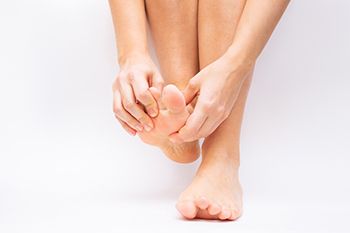
Big toe joint pain can be a nagging and debilitating issue, affecting mobility and daily activities. Understanding the root causes is imperative to finding effective relief and restoring comfort to your feet. One common culprit is osteoarthritis, a degenerative joint disease characterized by the breakdown of cartilage in the joints. When osteoarthritis affects the big toe joint, it can lead to pain, stiffness, and swelling, particularly during movement or weight-bearing activities. Another potential cause is gout, a type of arthritis caused by the buildup of uric acid crystals in the joints, resulting in sudden and intense pain in the big toe joint. Additionally, injuries such as sprains or fractures, as well as conditions like bunions or sesamoiditis, can contribute to big toe joint pain. Identifying the specific cause through a thorough evaluation by a podiatrist is essential for developing an appropriate treatment plan tailored to your needs. If you have big toe pain, it is suggested that you consult a podiatrist who can accurately determine what the cause is, and offer appropriate treatment methods.
Toe pain can disrupt your daily activities. If you have any concerns, contact one of our podiatrists of Livingston Footcare. Our doctors can provide the care you need to keep you pain-free and on your feet.
What Causes Toe Pain?
Most severe toe pain is caused due to a sports injury, trauma from dropping something heavy on the toe, or bumping into something rigid. Other problems can develop over time for various reasons.
Toe pain can be caused by one or more ailments. The most common include:
- Trauma
- Sports injury
- Wearing shoes that are too tight
- Arthritis
- Gout
- Corns and calluses
- Hammertoe
- Bunions
- Blisters
- Ingrown toenails
- Sprains
- Fractures (broken bones)
- Dislocations
When to See a Podiatrist
- Severe pain
- Persistent pain that lasts more than a week
- Signs of infection
- Continued swelling
- Pain that prevents walking
Diagnosis
In many cases the cause of toe pain is obvious, but in others, a podiatrist may want to use more advanced methods to determine the problem. These can range from simple visual inspections and sensation tests to X-rays and MRI scans. Prior medical history, family medical history, and any recent physical traumatic events will all be taken into consideration for a proper diagnosis.
Treatment
Treatments for toe pain and injuries vary and may include shoe inserts, padding, taping, medicines, injections, and in some cases, surgery. If you believe that you have broken a toe, please see a podiatrist as soon as possible.
If you have any questions please feel free to contact our office located in North Brunswick, NJ . We offer the newest diagnostic tools and technology to treat your foot and ankle needs.

 (732) 246-1377
(732) 246-1377



